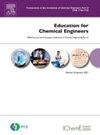Bridging the skills gap: Enhancing employability for chemical engineering graduates
IF 2.3
2区 教育学
Q1 EDUCATION, SCIENTIFIC DISCIPLINES
引用次数: 0
Abstract
Extensive research underscores a persistent skills gap among graduates across various disciplines. However, identifying the precise skill gaps in engineering education remains challenging due to inconsistencies in existing research, and studies specifically addressing employability skills in chemical engineering are limited. This study aims to address these knowledge gaps by identifying the critical employability skills necessary for chemical engineering graduates. The study employs a multi-method approach, incorporating a systematic literature review, surveys of students, alumni, and employers, and a statistical analysis of job advertisements for graduate positions. The objective is to establish a comprehensive understanding of required competencies and evaluate the alignment between employer expectations and graduate competencies. A structured skill framework was developed, encompassing 15 primary skill groups and over 75 sub-skills. Comparative analysis of employer perceptions and job advertisement data highlighted discrepancies in perceived versus stated skill priorities. However, competencies such as communication, interpersonal skills, self-management, and adaptability were consistently recognised as essential across sectors. Significant skill gaps were observed in areas such as communication, problem-solving, literacy, interpersonal, self-management, and business acumen. Survey findings indicate that engineering students often overestimate their technical proficiency while underestimating the importance of transferable skills such as resilience, ethics, and integrity. Conversely, employers consistently emphasise the need for a well-rounded skillset that integrates technical expertise with strong communication and management capabilities. This disconnect underscores the need for educational programmes to promote greater self-awareness among students and ensure their skill development aligns with industry demands. These results align with existing literature, reinforcing the importance of embedding transferable skills within engineering curricula to better prepare graduates for professional success.
弥合技能差距:提高化学工程毕业生的就业能力
广泛的研究强调了各学科毕业生之间持续存在的技能差距。然而,由于现有研究的不一致性,确定工程教育中精确的技能差距仍然具有挑战性,并且专门针对化学工程就业技能的研究有限。本研究旨在通过确定化学工程毕业生所需的关键就业技能来解决这些知识差距。该研究采用了多种方法,包括系统的文献综述,对学生、校友和雇主的调查,以及对毕业生职位招聘广告的统计分析。目标是建立对所需能力的全面理解,并评估雇主期望与毕业生能力之间的一致性。开发了一个结构化的技能框架,包括15个主要技能组和超过75个子技能。雇主认知和招聘广告数据的对比分析突出了感知与陈述技能优先级的差异。然而,沟通、人际交往能力、自我管理和适应能力等能力一直被认为是跨部门的基本要素。在沟通、解决问题、读写能力、人际关系、自我管理和商业头脑等领域,发现了显著的技能差距。调查结果表明,工科学生往往高估了他们的技术熟练程度,而低估了可转移技能的重要性,如弹性、道德和诚信。相反,雇主一直强调需要全面的技能组合,将技术专长与强大的沟通和管理能力结合起来。这种脱节强调了教育计划的必要性,以提高学生的自我意识,并确保他们的技能发展与行业需求保持一致。这些结果与现有文献一致,强调了在工程课程中嵌入可转移技能的重要性,以更好地为毕业生的职业成功做好准备。
本文章由计算机程序翻译,如有差异,请以英文原文为准。
求助全文
约1分钟内获得全文
求助全文
来源期刊

Education for Chemical Engineers
Multiple-
CiteScore
8.80
自引率
17.90%
发文量
30
审稿时长
31 days
期刊介绍:
Education for Chemical Engineers was launched in 2006 with a remit to publisheducation research papers, resource reviews and teaching and learning notes. ECE is targeted at chemical engineering academics and educators, discussing the ongoingchanges and development in chemical engineering education. This international title publishes papers from around the world, creating a global network of chemical engineering academics. Papers demonstrating how educational research results can be applied to chemical engineering education are particularly welcome, as are the accounts of research work that brings new perspectives to established principles, highlighting unsolved problems or indicating direction for future research relevant to chemical engineering education. Core topic areas: -Assessment- Accreditation- Curriculum development and transformation- Design- Diversity- Distance education-- E-learning Entrepreneurship programs- Industry-academic linkages- Benchmarking- Lifelong learning- Multidisciplinary programs- Outreach from kindergarten to high school programs- Student recruitment and retention and transition programs- New technology- Problem-based learning- Social responsibility and professionalism- Teamwork- Web-based learning
 求助内容:
求助内容: 应助结果提醒方式:
应助结果提醒方式:


